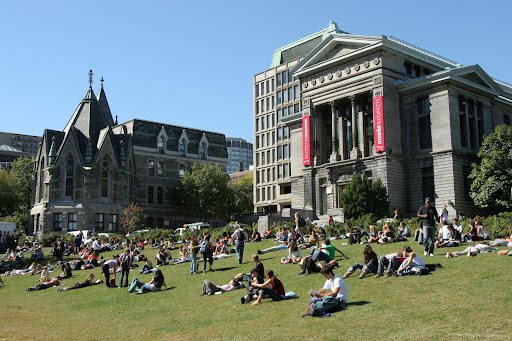Study Canada
How to study well in Canada
How to study well in Canada
When people think of Canada, the first things that come to their minds are massive mountains, vast forests, and majestic rivers. On top of that, Canada has always been proud of its one of the most efficient education systems in the world. This country was also first to adopt multiculturalism during the 1970s. As a result, the number of students studying abroad in Canada has increased sharply. Canada is ranked the best country to study abroad in 2 years in a row according to statistics in 2020-2021.
Moving to a new country to study can be quite challenging for international students. Being fully equipped with knowledge as well as learning about the culture and people in that country in advance will help them quickly adapt to the new environment. Here are the things you need to know before studying abroad in the “Land of Maple Leaves”.

Benefits of studying abroad in Canada
Canada is ranked one of the best countries to live in by the Sustainable Development Solutions Network of The United Nations based on different goals such as decent work and economic growth, good health and well-being, gender equality, etc. Cities in this nation such as Vancouver and Toronto are considered one of the best ones to settle and work in. Getting free healthcare service is an outstanding advantage of living in Canada.
A favorable visa policy: the SDS (Student Direct Stream) study permit does not require evidence of financial ability. Moreover, the Canadian government also sponsors up to 10 million CAD in order to reduce tax and simultaneously boost the Education Savings Plan so that more international students can study abroad here.
One of the best countries for Education: Degrees from Canadian institutions are just as valuable as those granted in other developed countries such as America, the UK. The University of Toronto, the University of British Columbia, etc. also appeared in the top 100 best universities in the world ranking. Canada is also an English and French-speaking country and is believed to be one of the world leaders in teaching languages.
Opportunities to work and settle in Canada: International students who graduated from educational institutions can stay and work up to 3 years using the Post-graduation Work Permit. The Co-op program allows students to work and earn money through internship programs in large businesses.
Lifting the tuition fee burden: With the country’s top-notch education system, tuition fees at Canadian schools are one of the most affordable among English-speaking countries. In addition, while studying in Canada, students are allowed to work 20 hours per week while school is in session and up to 40 hours/week during vacation periods.
How to study well in Canada
Make sure you have insurance to fulfill your urgent medical needs (including medical evacuation) while you are studying abroad.
1. Part-time jobs requirements:
- Canada only allows international students whose visa is valid for at least 6 months to work part-time and they have to be full-time students at a designated learning institution (DLI).
- Students are allowed to work 20 hours per week while school is in session and up to 40 hours/week during vacation periods.
- Students may be able to work on-campus or off-campus. A work permit must be granted by your school in Canada.
2. Expenses
- Transportation: You can choose to travel by bus or consider other options such as bicycle, taxi, train, subway, etc. The local ticket price for a one-way bus trip: 2 CAD – 3 CAD.
- The Consulate General of Canada requires students to be financially efficient during the first year of staying in the country. However, you still need to cover your living expenses in the next few years so make sure you are well-prepared financially before traveling to Canada.
3. Required documents:
- Passport: Make sure you take a valid passport and visa with you!
- Student visa: 2 types of visas: MULTIPLE visas allow multiple entries and SINGLE visa allows one entry only. However, you should also ask for advice from your local CIC agency before leaving Canada as sometimes there are new regulations that you may have not caught up with.
- Letter from the Canadian Embassy: When you arrive at the Canadian border gate, you will have to demonstrate the original study permit from the Embassy to the immigration officer.
- Birth Certificate: Bring 2 notarized Vietnamese copies and several notarized English or French translations.
- Report cards: You will probably need your report cards when applying to foreign schools. Therefore, it is advisable to have a Vietnamese version of your report card and several notarized English or French translations.
- Degrees: Bring the original notarized High School/College/Bachelor’s Degree depending on your level of education. You will need them to apply for higher education.
- Bring a small notebook in which all the necessary addresses, phone numbers, email addresses of your school, the names of the responsible people, acquaintances in Canada, your home, names of teachers, the church, hospital, insurance company, credit card company, bank, etc. are noted.
Types of visas to Canada
Depending on your purpose of traveling, there are several types of Canada visas that you can apply for. Here are some of the most popular visas to consider:
- Tourist Visa:
- Tourist Visa (Single): allows only one entry to Canada. Once the validity period ends, you must come back to your home country and must apply for a new visa if you desire to come back.
- Tourist Visa (Multiple): allows multiple entries to Canada as long as the visa is still valid.
- Student Visa: in order to successfully enroll in study programs, students must meet the requirements from the country they are staying in.
- Federal Skilled Worker Visa: This program is for skilled workers with foreign work experience promulgated by the Canadian government to welcome more workers.
- Family Class Visa: For relatives (spouse or children) who are officially Canadian citizens and possess a permanent resident card.
- Small Business Owner Visa: attracts investors around the world to come and work in Canada. However, a large amount of investment and assets is required for applying for this type of visa.

Make studying abroad in Canada easier with StudyLink
With over 17 years of operation, all of our staff from different departments are always available to provide support for customers with consulting, vocational guidance, handling documents, translating and notarizing, training for interviews, scholarships and visa application; completing visa procedures, handing in and receiving papers and plane tickets. Thanks to the conscientious support from our experienced and professional consultants, all requests regarding studying abroad in Canada have been completely handled.
Besides supporting customers throughout the process of demonstrating financial ability, job explanation, and instructing interview methods to ensure the highest possible success rate in applying for a visa, StudyLink also supports other services such as Visa application for family members who want to visit their children, organize summer courses and tours to Canadian schools.
StudyLink also offers other services for parents to accompany their children during their learning progress.
Studying in Canada is truly an adventure and a true experience of natural beauty, a multi-ethnic culture, combined with a world-class education system. Should you need more information about studying in Canada, do not hesitate to contact the StudyLink office for advice and conscientious support who would certainly help increase your chances of getting a Canadian Student visa!













